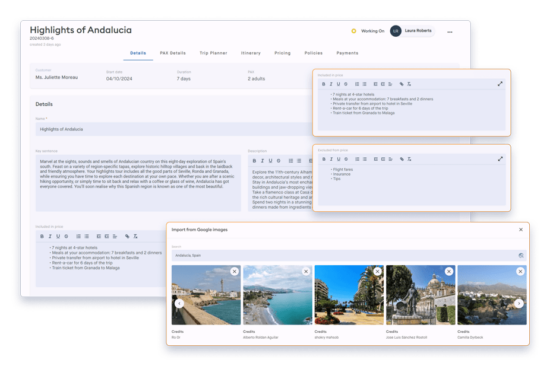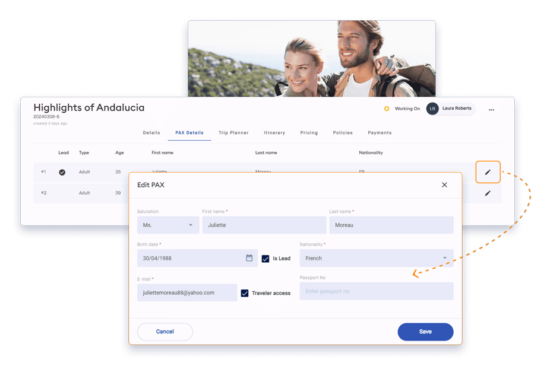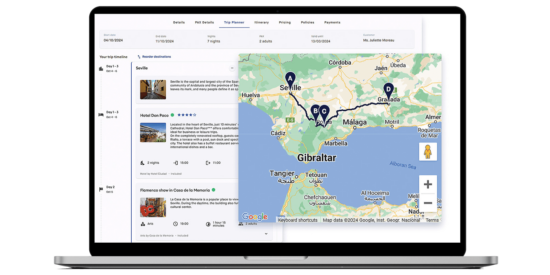
5 Ways to improve Travel Agency and Tour Operator Website

In today’s disruptive world, travel agents and tour operators are using many digital marketing channels to engage and bring potential customers to their websites.
Based on the ITB study, 74% of all travelers research multiple websites before booking a trip. This shows that you need to be present across all digital marketing channels.
Days of prospects knocking on the door and coming to the agency office to book their trips are long gone. Nowadays, everything is happening online, and this trend will continue in the future.
So travel agents and tour operators need to adapt and utilize websites to attract new customers quickly.
Why is a Website Important for Travel Agents and Tour Operators?
The website is the most important digital marketing channel for many travel agencies and tour operators. This is where agents keep all information about upcoming trips, itineraries, descriptions, images, price per person, and other key information.
Everyone is expecting the website to be easy to use and to navigate across all divides at any time.
Google Mobile’s first algorithm also crawls the first mobile version and ranks based on mobile UI and UX. A mobile-friendly website is also one of the leading SEO (Search Engine Optimization) factors and can negatively impact SEO and your position in Google search.
How to SEO optimize a website?
1. Keyword Research
Before you start building a trip, you need to research keywords and identify what prospects are looking for. You can use free search volume tool to identify keyword volume.
Below you can see the keyword ‘trips to London’ has 880 searches per month. This is a good keyword to target since it has a good number of searches per month.
2. Build Keyword Groups
Once you find the keywords you want to target, you need to group them. Make sure that you choose carefully which keywords you want to include in each group.
For example, ‘Trip to London,’ ‘London trip,’ ‘4 days London Trip.’ Keywords are similar and can be put into one group. On the other hand, keywords like ‘UK trip’ or 4 days UK trip’ are not similar and therefore need to be added to a different keyword group.
You need to keep in mind that you can optimize a landing page for up to three keywords part of the same keyword group.
3. Start creating itinerary text
After research and grouping, you are ready to start creating content. Google likes text, so include as much information about your trip as possible.
The study has shown that pages with over 1,000 words rank four times better than pages with less text.
Look what your competitors created. By searching for a keyword on Google, you can see what kind of content ranks well. Your main goal should be to cover the topic as much as possible and to include keywords inside the document.
4. Include keywords in H-tags
Once the text is created, make sure that you include keywords in H-tags. You can check your H-tags by using Heading Tag Markup chrome extension.
Your H1 tag needs to have the most important keyword you want to rank for. Also, H2 and H3 tags need to have the same or similar keywords.
Make sure you only have one H1 tag in your article. Multiple H1 tags can confuse google and penalize you from getting on page one.
You can, however, have multiple H2 and H3 tags per article.
5. Create a unique title and meta description
Title and meta description is what people will see on Google. It is vital to include the keyword in the title and meta description.
Make sure you keep the title and meta description within character limits.
Title: 75 characters
Meta description: between 150 and 300 characters.
The best practice for meta description is to start with engaging verbs such as; find out, discover, explore, etc. This will attract searchers and improve CTR (click-through rate).
Also, the study has shown that the results with a number in the title or meta description tends to have a higher CTR.
6. Crawl and index your page
Once you go live with your landing page, log into Google Search Console and request indexing.
This will help you identify any potential issues with your page and speed up the process of ranking for the keyword.
GSC will also tell you for which keywords your page is showing up. If you think you are not getting enough clicks and impressions for the keywords you intended to rank, make sure you go back to your page and check if you have the keyword in the title, meta description, H1 tag, and throughout the text.
Conclusion
Website is the most crucial channel for travel agents and tour operators, and it takes time to get from the idea to pushing the content live.
It is vital that you keep your audience in your mind throughout the entire process from research to execution. You are speaking to a human so the flow of the article is as important as the keywords you are trying to rank.
SEO is a long-term game. It usually takes between 6 and 8 months to get on page one. So be patient and don’t freak out if you are not getting many clicks the first couple of months.
Last but not least, TripMatrix WebBooking Engine can help you speed up the process by providing a subdomain for free. You will be able to start building your content right away and promote it to our partners worldwide.
Also, if you are looking for ways to manage your travel business, read 6 reasons why you should use a travel agency software and find out how you can save money and become more efficient.
Recent posts
The Best Travel Agency Software
What is Travel Agency Software? Travel agency software is a set of solutions built for travel agencies, tour operators, and DMCs to help them manage [...]
How Travel Management Software Can Reduce Corporate Travel Expenses?
More companies are relying on business travel agents to reduce corporate travel costs. Instead of employees self-booking their business trips, hiring [...]
What is a Travel Management Software?
Travel management software is an all-in-one system for organizing business travel. With the rise of business travel, there’s a need to simplify the [...]


